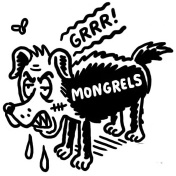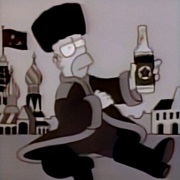|
Epicurius posted:She didn't give up. She died. And then her son, Paul I, made some reforms. He banned corporal punishment of non-serfs, introduced some laws protecting serfs, and made it easier for peasants to buy land. As a reaction against the French revolution, though, he also increased censorship and became more autocratic. Then, after he was assassinated by some nobles, his son Alexander I took the throne. I'm not sure if connecting democratic ideals in modern day states to stuff that happened during the European Enlightenment is particularly helpful
|
|
|
|

|
| # ? May 15, 2024 15:42 |
|
Ras Het posted:I'm not sure if connecting democratic ideals in modern day states to stuff that happened during the European Enlightenment is particularly helpful I don't know if it is or not, although I think there probably is some connection. I just disagree with the "Russia was immune to the Enlightenment" argument.
|
|
|
|
I was being overly glib. Probably more accurate to say Russia was the European power least influenced by the Enlightenment.
|
|
|
|
Democracy in Russia is a really interesting subject, and part of the broader constellation of issues that I study. I'm not sure the Enlightenment is the right place to understand it though. Even as an expert in the field I'm not really sure I understand where Russia's historical aversion to democracy comes from, but I'd be more likely to blame the material conditions of Russian life and social structure, which ended up as an extremely stratified and unequal society by the time any form of democracy was possible in the early 20th century. 85% of the population were undereducated peasants often only one step above subsistence farming, and most of the rest were impoverished urban workers. The tiny group of people with actual political power were mostly extremely conservative noblemen, and then there was a pretty small but still influential "middle class" of professionals and intellectuals who were the people most likely to want democracy in the way we think of it, as in institutions and voting. The peasantry weren't really "democratic" but they definitely had developed and even radical ideas of popular power, but those ideas didn't necessarily revolve around the mechanics of voting and electing representatives. (there's an interesting book by Steven Hoch that argues that peasant social structures were basically set up to ensure maximum patriarchal social control because they were always on the verge of starvation--and those conditions don't really lend themselves to voting and democratic decision-making) The workers in the cities weren't much better though, and often interpreted democracy as meaning just give the workers all the power and let them do what they want. There's a famous article by Boris Kolonitsky about what the word "democracy" meant in 1917, and it didn't mean hey guys let's get together and vote for the president, it was used as a social signifier, "democracy" was the word used to describe workers, soldiers, and peasants as a big social class, the opposite of the bourgeoisie. (Russian doesn't use articles, so demokratiia is usually translated as "the democracy" instead of "democracy" to make this distinction clear) When you read sources from that era and people are saying "we want a democratic republic" that doesn't necessarily mean they want a republic where everyone votes, it could also mean they want a republic where workers have all the power and the bourgeoisie are powerless. There's also an interesting argument that one big problem in this particular arena was that a huge proportion of Russian intellectuals basically skipped capitalism and bourgeois liberalism because Russia was an underdeveloped economy. By the time Russian industry and commerce were developing to near comparable levels with Western Europe, Western Europe had already been capitalist for decades and critiques of capitalism were already well advanced. So a lot of Russian intellectuals basically skipped the stage where they think liberal capitalism is great and wonderful, and went right to the stage where they think it's horrible and degrading because they saw workers in Europe being exploited and mistreated and they were reading the critiques of guys like Marx and Engels, and a lot of them ended up basically wanting to skip capitalism and head straight to socialism one way or another. Even Russia's "liberals" by the late imperial era were proud to announce that they were the farthest-left liberal party in Europe, and the policies they campaigned on were almost social-democratic, far from the idea of limited government--though they were still the groups most supportive of individual civil rights. Of course, the biggest stumbling block for any kind of democratic governance in this era was the imperial state and its base of conservative nobles. They essentially hated the very idea of democracy and did their level best to undermine it at every turn. Every now and then a tsar would come along who thought Russia needed some liberalization, and they would do things like free the serfs and reform local government. But inevitably something bad would happen--for example, the tsar who freed the serfs and instituted Russia longest period of sustained reforms was assassinated two decades later by some revolutionaries--which would make either that tsar or their successor opposed to any further reforms, or even devoted to undermining the reforms that did exist. What "democratic" institutions did exist tended to be extremely limited in both electorate and in power. So you had city councils elected by 0.5% of the population since only people with a certain level of wealth could vote, which was alienating to everyone else in the cities when those city councils inevitably just did whatever helped rich people and didn't care about anyone else. And the Duma, Russia's first national parliament, had its first two sessions prematurely dissolved by the tsar because they were too radical, so the prime minister promptly rewrote the electoral law to make these indirect, byzantine elections heavily biased towards conservative landowners, ensuring that conservatives would rule in the Duma. On top of that, if you somehow did get progressive legislation through the Duma it would almost certainly be overruled by the second chamber, the State Soviet, which was exclusively conservative nobles. And the state and far-right groups also regularly interfered in these elections, doing voter suppression, threatening progressive or minority voters with violence if they didn't stay home, that sort of thing. These ended up being Russia's first experiences with actual democracy, and the lessons they tended to learn was that voting didn't matter. The liberals who loved the idea of democracy were constantly complaining about the indifference and apathy within the broader electorate towards voting on local and national levels, because either they were completely disenfranchised and didn't have a say at all, or when they did vote it didn't matter because they were overruled by the conservative nobility, and even if they did manage to get someone who represented them into the Duma, the Duma itself was more or less powerless. I would say that the root cause of a lot of this was that Russia was a state that didn't trust its own people, and this was true of both the conservatives who ran the state and the liberals who criticized it. The tsar himself and ardent monarchists tended to believe in some innate link between tsar and people, that required no mediation by institutions, whether a parliament or a bureaucracy--but when it came time to write policies for how to govern these people, it was all about controlling them, their actions, their movements. Russia kept an estate system until 1917, which was supposed to restrict what people were allowed to do with their lives, but was applied unevenly, haphazardly, and arbitrarily so it didn't matter at all until suddenly it did because you couldn't do what you wanted to. Russia kept people tied to the land and to specific places on the land with an arbitrary passport system. Even when the serfs were emancipated from their landlords, they still weren't emancipated from the land, they were just tied to it through a peasant commune system where the village leaders exerted similar control over their fellow peasants as the landlords had, but for different reasons (if a peasant left the commune, the others would have to pay their share of taxes). National minorities were even more restricted, especially Jews. At the same time as there was a belief in the innate link between tsar and people, there was also a deep distrust of the people as potential sources of disorder, chaos, and violence, which was underlined by a hell of a lot of violence directed against the state and against landlords whenever tensions got too high. There's another argument I've seen about where this distrust comes from, that Russia was so big and vast, and had such porous borders for such a long time, that the state was deeply invested in making sure its people didn't just wander off to get out of their obligations. And the liberal intellectuals, while better, still didn't trust the people. They often saw the Russian people as ignorant, backward, uneducated, and unable to handle the responsibilities of being citizens. They believed in democracy and civil rights, but basically thought these things had to be rationed to a population that wasn't yet conscious of how to use them. They worried that if just handed all the power and responsibilities of being citizens in a democratic country, the people, especially the backward peasantry, would vote for backward things instead of for rational progress. So how do you institute democracy in a country where you don't trust 85% of the population to vote for the right things? Even leading liberals like the leader of the Constitutional Democratic party, Paul Miliukov, thought Russia wasn't ready for direct democracy and needed to keep some kind of indirect or unequal system in place. Their priority was often on educating the people before entrusting them with any real power or responsibility, thinking that you had to teach the people to be citizens before they could be trusted with the responsibilities of citizenship. Possibly making all this worse was that when Russia did suddenly become a democracy in 1917, and suddenly all elections were universal, direct, equal, and secret, the country was in such a crisis that voting made very little difference. The economy was collapsing, they were losing the biggest war they had ever fought, people were starving because they couldn't afford bread in the cities, law and order more or less disappeared overnight, and so on, and none of the democratic or pseudo-democratic institutions that existed in 1917 were able to solve these problems, probably because nobody could.* There were empire-wide city elections in the summer of 1917 where people tended to vote overwhelming for socialists, especially the peasant socialist party, but by the fall when they were supposed to hold elections to the Constituent Assembly that would write Russia a new constitution, you can read desperate appeals by Russian intellectuals telling the electorate "look we know your vote back in the summer didn't accomplish anything, but that's because of our national crisis, not because voting is unimportant, please for the love of God go out and vote in this upcoming election". And of course the Constituent Assembly was dissolved after like six hours by the Bolsheviks, who by that point were in power in Petrograd and determined to stay there even though they hadn't won the election. Going back to a previous point, they were the people most dedicated to the idea that "democracy" meant workers and soldiers in power. They were the representatives of the democratic classes and they were now in power, so if some institution elected by the people tried to say it should be in charge instead, that was undemocratic and even anti-democratic because they were trying to remove the representatives of the democracy from power. And that remained more or less the dominant interpretation of democracy in the USSR. Democracy meant having the people in charge, but it didn't require anything like voting or compromising, so since the Communist Party was the representatives of the people, therefore the country was democratic because they were in charge. And of course the USSR continued the long Russian tradition of not trusting the people and trying to control them. And vestiges of centuries of control and mistrust continue today, like Russia still has a passport system similar to what existed in the USSR and the Russian Empire, where you have an internal passport that you keep on you at all times and you have to register where you live so the state can always keep track of you, and so on, and so on. I'm not sure Russia has ever been a place where elites trusted the people to make important decisions like who should be in power, and even when those opportunities did arise as they did in 1917, they were hamstrung by circumstance and in some ways only tended to reinforce the popular idea that voting accomplishes nothing and doesn't matter. * law and order is a good example here. The new government in 1917 dissolved all the tsarist police and secret police institutions because they were so hated and so representative of the hated old autocracy. They also did a huge amnesty of people convicted by the old regime, which freed a lot of non-political criminals as well as political prisoners. With Russia in a huge economic crisis, many of these prisoners, along with a lot of other people, promptly started doing crimes again, and with no police around to stop them except some random militias and local guard units, crime was rampant. It takes a long time to rebuild police and judicial institutions from scratch, especially when you don't trust any of the former policemen and judges to continue doing their jobs and you don't have enough educated people to appoint as new judges, and that was time that Russia didn't have in 1917. There's a recent book by Toshi Hasegawa making the argument that the state of crime and lawlessness was another big reason why people were willing to let the Bolsheviks take power - kind of like the argument I've read about why people in Syria were willing to accept ISIS, because even though the order they brought was so severe, it was still seen as better than the anarchy that existed before.
|
|
|
|
Look Sir Droids posted:I was being overly glib. Probably more accurate to say Russia was the European power least influenced by the Enlightenment. i mean its one of those great what if's. Alexander Ist could have followed previous examples but went reactionary when poo poo went bad for monarchs after the french revolution and napoleon. his grandson could have possibly reformed more but he got blown up and russia just kinda went backwards until the revolution. EDIT ^ what they said. Dapper_Swindler fucked around with this message at 05:37 on May 27, 2019 |
|
|
|
vyelkin posted:Info dump Thanks for that, it's interesting - I suppose it's more evidence that there is something to the Burke, Selden, Fortescue etc line of conservative thinking about how grand ideas needed to be digested and adapted within the norms of a culture rather than imported in a vulgar fashion (in line with Niklas Luhmann and Gunther Teubner's theory of systems development, too, for something from an entirely different line of thought that comes to similar conclusions). Re the proletariat and peasantry - I seem to vaguely recall as well from a book I read by Martin Malia there was some attempt by radical thinkers in the mid-19th century to encourage the peasantry to be agents of the new revolutionary state, but that they failed utterly as peasants didn't really look to take things further than a sporadic and localised jacquerie (the sickle part of the USSR flag he argued to be a purely symbolic token by Lenin, who had no real interest in furthering the peasantry but was merely looking to claim the many small jacqueries that took place around the October Revolution as related to the Bolshevik cause). How did those radical peasant types fit in, if I may ask?
|
|
|
|
Neurosis posted:Thanks for that, it's interesting - I suppose it's more evidence that there is something to the Burke, Selden, Fortescue etc line of conservative thinking about how grand ideas needed to be digested and adapted within the norms of a culture rather than imported in a vulgar fashion (in line with Niklas Luhmann and Gunther Teubner's theory of systems development, too, for something from an entirely different line of thought that comes to similar conclusions). Re the proletariat and peasantry - I seem to vaguely recall as well from a book I read by Martin Malia there was some attempt by radical thinkers in the mid-19th century to encourage the peasantry to be agents of the new revolutionary state, but that they failed utterly as peasants didn't really look to take things further than a sporadic and localised jacquerie (the sickle part of the USSR flag he argued to be a purely symbolic token by Lenin, who had no real interest in furthering the peasantry but was merely looking to claim the many small jacqueries that took place around the October Revolution as related to the Bolshevik cause). How did those radical peasant types fit in, if I may ask? Good question! I'll get to it as part of this post when I discuss the Populists, I promise. I've been thinking a bit more today about the original comment that prompted this discussion, that Russia was "immune" to the Enlightenment. I wouldn't say that. I wouldn't even say Russia missed out on the Enlightenment. Russia had its share of Enlightenment thinkers and its share of students of Enlightenment thought. Maybe fewer than in other countries, but it's important to remember that Enlightenment thinkers were already a tiny minority in Western Europe as well. Russia also had its "enlightened" rulers, like Catherine the Great (you could make an argument for Peter the Great as an enlightened monarch as well). I think more importantly, with regards to the relationship between the Enlightenment and democracy is that many Enlightenment thinkers, even in Western Europe, weren't particularly democratic by modern standards. Sure, they wanted their individual liberties and they wanted to constrain the power of the state, but many of them had the same sort of mistrust of the common man that I described in Russian liberal circles in my previous post. Rich educated Enlightenment men often came to the conclusion that giving the masses the right to vote was dangerous because the poor might vote to take away their precious property rights. Rule by an unenlightened majority would be mob rule, and that would be just as bad as rule by a single unenlightened monarch, in that both could infringe on the sacred individual liberties of the rich educated men who were writing these treatises. If the masses were to be allowed to vote at all, their potential actions had to be restricted by a strong constitution that would stop them from voting to take away the rights of the wealthy. That's a big part of why even "democratic" countries in the 18th and 19th centuries were usually not that democratic by modern standards, disenfranchising huge swathes of the population based on race, gender, and wealth, and often only gradually extending the franchise when they were certain that the newly-enfranchised groups wouldn't cause trouble for them--and often in response to mass movements by labourers and others demanding the right to vote (think the Chartists in Britain, who Engels saw as proto-socialists). These were very similar concerns to those being expressed by educated Russians in the early 20th century about the possible effects of enfranchising millions of "backward" peasants before they had been properly educated and enlightened. What I think Russia missed was that sort of "post-Enlightenment", if you will, the gradual extension of Enlightenment thinking to the majority of the population, that came in the 19th century in most of Europe. This took a long time--even a century after the French Revolution, the ideals of that revolution still hadn't fully penetrated the French countryside, until the state started taking a really forceful line on imposing them (see Weber, Peasants into Frenchmen). But Russia didn't really do this, and I would say the main reason why is that the conservative autocratic state was adamantly opposed to it, instead of playing a facilitating role, or at least a more neutral role, as it did in some other major European countries. To understand why this is, it's useful to have a crash course in 19th-century Russian history: Alexander I (r. 1801-1825) ruled as tsar in the Napoleonic and post-Napoleonic eras. Started out as a pretty enlightened, liberal guy and was idolized by Russia's small cadres of liberal elites, but moved away from this liberalism in the second half of his reign. When he died childless in 1825, some members of these small groups of educated, liberal nobility decided that was their moment to make good on the unfulfilled promises of Alexander's reign, so they tried to stage a coup. When it appeared that Alexander's brother Nicholas would take the throne, these "Decembrists" demanded that instead the elder brother Constantine (who didn't want the throne) be named tsar instead, and that they institute a constitution at the same time. Well Nicholas wasn't having any of this, so he suppressed the Decembrists with military force and then exiled them all for good measure. Then he reigned for three decades as an arch-conservative, like his entire reign was defined by the moment when liberals tried to prevent him from taking the throne so he spent his whole life as tsar making sure that wouldn't happen again. He established secret police forces, doubled down on religion and autocracy, sent Russian troops all over Europe putting down liberal uprisings, and so on. He also severely cracked down on Russian intellectuals who were engaging in European thinking, driving them underground, exiling them, forbidding them from studying abroad, getting rid of potentially subversive topics in Russian education institutions, and so on. Then in the mid-1850s he died partway through losing the Crimean War to industrialized Britain and France, and was succeeded by his son, Alexander II (r. 1855-1881). Alexander II recognized the need for reforms, which were made abundantly apparent by losing the Crimean War, and so he led what became known as the Great Reforms in the 1860s. The biggest reform was the emancipation of the serfs in 1861, but he also reformed the judiciary, the military, local government, and a bunch of other parts of the Russian state as well. Like his namesake Alexander I, though, he turned away from liberalizing reforms in the second half of his reign. Russian intellectuals responded by trying to subvert his reign with radical, even revolutionary activities, like the "going to the people" movement. By now we're in the 1870s, and this is the moment of Russia's "populists" mentioned in Neurosis's post. The populists were an offshoot of Russian intellectual traditions, pseudo-socialists who were heavily influenced by critiques of industrial capitalism in Western Europe (the kind of critiques written by guys like Marx and Engels). They thought capitalism was so bad that Russia should try and avoid it altogether, bypassing it and going straight for socialism, and they thought Russia had the perfect homegrown institution to be the foundation of that socialism in the form of the peasant commune, viewing peasants as both the basis for future socialism and the potential revolutionary class, in contrast to established Marxism that saw urban workers as the revolutionary class. So in the 1870s a whole bunch of university students influenced by this line of thought left their universities and went out into the villages, to try and learn from the peasants how to be good socialists and to try and incite the peasants into being revolutionaries. The conservative and patriarchal peasantry found these middle- and upper-class students extremely bizarre and often reported them to the authorities, and in any case this whole movement collapsed, hundreds of the students were imprisoned and exiled (again), and the repression of this movement, and of the Populists in general, was part of what made Russian intellectuals disillusioned with Alexander II as tsar--and also what made full-blown Marxism focused on the working class the dominant strain of Russian radical thought. Some of the Populists turned to revolutionary terrorism in response to this repression, and in 1881 they assassinated Alexander II in the streets of Saint Petersburg. Well that didn't work out so well for them. His successors, Alexander III (r. 1881-1894) and Nicholas II (r. 1894-1917) basically took the view that if even the Great Reforms and Emancipation weren't enough to satisfy Russia's liberals and radicals, to the point that they would assassinate the "Tsar-Liberator" Alexander II, then nothing would ever be good enough for them. So instead they were extreme reactionaries who tried to undo as many reforms as possible, and cracked down with extreme repression on any reformist or revolutionary movements in the empire. In 1905 there was a revolution in response to Russia's loss in the Russo-Japanese War, which led to an ambiguous, half-hearted constitution, the October Manifesto, and created a parliament, the Duma, but even that was steadily disempowered and restructured to be more conservative/reactionary over the following decade by Nicholas II and his ministers. Until eventually World War I came along, and 1917, and Nicholas was overthrown and the Bolsheviks seized power. So basically what I would say the trend is here is that over the course of the 19th century there were multiple waves of potential liberalizing reforms from above, often along the lines of Enlightenment values and stemming from enlightened monarchs and enlightened intellectuals (the educated bureaucracy played a huge role in laying the foundations for the Great Reforms, for example), similar to how it played out in other states. But Russian rulers were always suspicious of autonomous action by groups in society and their reforms always had one eye on controlling the potentially rebellious population (for example, the continuation of control over the peasantry via the village commune after emancipation) and reforms never seemed to go far enough (for example, emancipation itself was heavily weighted towards the former landlords, who got to keep the best land and charge the peasants rent for using it, and who were paid "redemption payments" by their former serfs for half a century afterwards), and their suspicions seemed to be regularly confirmed by Russian radicals overplaying their hand and trying to stage coups or assassinations, which just confirmed the suspicions of Russian conservatives that the radicals would never be satisfied and that any kind of reform was dangerous. The end result was an extremely obstinate and reactionary state and rulers, who resisted any efforts at reform or the spread of Enlightenment values among the broader population, and enforced their suspicions with violent repression, secret police, exile, imprisonment, and so on. That, I think, is where Russia really diverged from the Enlightenment trends elsewhere in Europe: while other states were making gradual reforms over the course of the century in response to popular demands, trade union movements, the growth of socialism, and so on, the Russian state was for the most part adamantly opposed to granting any concessions to these kinds of popular demands, and when reforms were enacted, they were often undone or undermined by the next ruler anyway, as a backlash against the actions of Russia's radicals.
|
|
|
|
Nice Russia posts.
|
|
|
|
camoseven posted:Can someone recommend me a book about the War of 1812? I know basically nothing about it, so something intro-y would be good.
|
|
|
|
Galvanik posted:I really liked "Russia against Napoleon" by Dominic Leiven. It's uses Russian sources, rather than the usual British or French the author claims most Anglo histories use, and is all about the Russian war effort and strategy. The War of 1812 was a conflict between the USA and Great Britain, not Napoleon's invasion of Russia.
|
|
|
|
vyelkin posted:The conservative and patriarchal peasantry found these middle- and upper-class students extremely bizarre and often reported them to the authorities, Thanks for the very informative post; this part in particular made me laugh. I'm imagining some animated young educated type rabbiting on to a taciturn peasant about a fantastic program and how it would be for the benefit of all peasants and the peasant having an internal monologue along the lines of 'This guy is loving weird' while grunting noncommittally.
|
|
|
|
They basically learned that peasants were nothing like what they thought and wanted and became incredibly disillusioned and violent.
|
|
|
|
vyelkin posted:...viewing peasants as both the basis for future socialism and the potential revolutionary class, in contrast to established Marxism that saw urban workers as the revolutionary class. So a whole bunch of university students influenced by this line of thought left their universities and went out into the villages, to try and learn from the peasants how to be good socialists and to try and incite the peasants into being revolutionaries. The conservative and patriarchal peasantry found these middle- and upper-class students extremely bizarre and often reported them to the authorities, or "Jack", as he is usually known
|
|
|
|
Not quite a book question, but there doesn't appear to be a general history questions thread currently: Is there any reliable information on the cause of Charles IV of France's death? Sumption says he died of unknown causes, but only devotes around a paragraph to him (at least in Trial by Battle), and most of that on the immediate problems his death (along with Louis X's and Philip V's) caused. Just wondering if there are any plausible conjectures out there.
|
|
|
|
SubG posted:Not quite a book question, but there doesn't appear to be a general history questions thread currently: Can't offer an answer but will just relate to your obvious experience - I just started reading Sumption's Hundred Years' War history and am immensely enjoying his style (25% through Trial by Battle). A lot of the descriptive parts feel like good fiction prose - he paints very lurid images. I'd read some of his legal judgments previously for my job, but obviously they didn't do justice to his writing abilities, given the subject matter.
|
|
|
|
I am reading 1421 -The Year China Discovered the World by Gavin Menzies. I saw some vague criticism of the book in this thread but I have not looked into any detailed rebuttals that may exist. Does anyone have links or info on why 1421 would be wrong in claiming that Chinese fleets sailed to Australia, America etc. long before western explorers? So far I am siding with Menzies based on the ample evidence he mentions. He cites genetic studies, archeological evidence, ancient maps among other things and his strong point, understanding navigation and mapping (Menzies was a submarine commander in the Royal Navy and those guys know the sea better than any historian out there.) What I am curious about is to hear the other side of why his findings would not be right. Is there more than cultural inertia and chauvinism to back and fuel his critics? If the author is not a historian, it does not automatically lead to his research being less worthy of note, in my opinion. But I am no academic. If you find his book to be crap on other details, feel free to add your opinion, I just would prefer to hear about the various historians who might agree or disagree with him and why. Western history as it has been written is what it is, for better or worse. I don't see much that would be all that controversial in the book so far (still reading). Maybe it falls off towards the end, I would not know as of today. Also: Is there any opinion on Yuval Noah Harari; Sapiens - A Brief History of Humankind? I have not gotten around to reading it yet.
|
|
|
|
SlightlyMad posted:I am reading 1421 -The Year China Discovered the World by Gavin Menzies. I saw some vague criticism of the book in this thread but I have not looked into any detailed rebuttals that may exist. Does anyone have links or info on why 1421 would be wrong in claiming that Chinese fleets sailed to Australia, America etc. long before western explorers? So far I am siding with Menzies based on the ample evidence he mentions. He cites genetic studies, archeological evidence, ancient maps among other things and his strong point, understanding navigation and mapping (Menzies was a submarine commander in the Royal Navy and those guys know the sea better than any historian out there.) I know nothing about Chinese history so can't really add to it, but Wiki is a good place to start: quote:Criticism I bolded the best bit because uh, dude, that's not how historical research is supposed to work.
|
|
|
|
SlightlyMad posted:What I am curious about is to hear the other side of why his findings would not be right. Is there more than cultural inertia and chauvinism to back and fuel his critics? If the author is not a historian, it does not automatically lead to his research being less worthy of note, in my opinion. But I am no academic. I have not read the book, but as far as I know it is considered to be the rankest psuedohistory. In any case, here is a linguist debunking some of the linguistic evidence Menzies presents: http://itre.cis.upenn.edu/~myl/languagelog/archives/000409.html quote:The first linguistic point raised in the book (p. 104) concerns an inscription found in the Cape Verde islands off the West coast of Africa, which Menzies attributes to Zheng He. Unable to identify the writing system, he wonders whether it is an Indian writing system and faxes a query to the Bank of India, which informs him that it is Malayalam. Unfamiliar with Malayalam, he asks where it was spoken and whether it was in use in the 15th century. According to Menzies, the Bank of India responded as follows:
|
|
|
|
lol just lol if one of his pieces of "evidence" was really just faxing a bank because he thought they would be experts on historical linguistics
|
|
|
|
Yeah, "needs more evidence" seems about right. As a book it is not an academic history book but I will look at whatever claims he makes with some considerable scepticism. That said, I try to be both openminded and sceptical of critics too. (I still don't find the premise of the book preposterous, just unproven.) What about Harari?
|
|
|
|
SlightlyMad posted:Yeah, "needs more evidence" seems about right. As a book it is not an academic history book but I will look at whatever claims he makes with some considerable scepticism. That said, I try to be both openminded and sceptical of critics too. (I still don't find the premise of the book preposterous, just unproven.) Not to pile on too much, but "needs more evidence" is not right for cases like this. "Misguided and misleading" is right; he's not just wrong about one or two facts, his methods of investigation are totally wrong and he is clearly guided by a desire to prove something right than to investigate a question. This isn't somebody who came close or is on the right track and just needs a little more help to finish off, this is classic crank writing. Treating the critics equally sceptically in the sense of assuming equal weight to their points is spurious both-sidesism that does a disservice to proper techniques of historical or scientific investigation. It's appropriate to be sceptical of critics' claims, especially when they are invested in the current system, but on the other hand credit should be given to the side employing proper, proven, rational techniques of analysis. That doesn't mean current historians are completely right about historic patterns of migration or exploration. However, it does mean that this book is not a useful way to learn more about it, other than by negative example.
|
|
|
|
Menzies' work here is on par with people who are dumb enough to not understand that Plato never intended you to believe Atlantis was a real place that really existed at one point. You can come up with a lot of interesting stuff trying to find places that kinda look like random attributes of Atlantis, and that makes for a good travelogue concept or other things like that. But you can never make a real history book about "this one place was definitely Atlantis" due to the fact that it was always fictional. Similarly Menzies spins a pretty good yarn about how China went places while conveniently ignorning all the evidence that his theories don't make sense. It's basically writing an alt-history novel that likes to add references to the real things it was riffing off.
|
|
|
|
SlightlyMad posted:Yeah, "needs more evidence" seems about right. As a book it is not an academic history book but I will look at whatever claims he makes with some considerable scepticism. That said, I try to be both openminded and sceptical of critics too. (I still don't find the premise of the book preposterous, just unproven.)
|
|
|
|
SubG posted:Menzies' theory that Chinese explorers circumnavigated the globe in 1421 needs more evidence in the same sense that the theory that aliens built the pyramids does. Yeah. It is utter, complete nonsense with no basis in anything whatsoever. There is zero evidence for any of his claims. More stuff: https://historycooperative.org/not-rewrite-world-history-gavin-menzies-chinese-discovery-america/ The only thing in the book even remotely possible is Chinese sailors had been to Australia, since we know the Chinese traded in Indonesia and it wouldn't be that hard to get lost and run into Australia from there. But even that has no evidence at all, it's just possible to imagine it happening.
|
|
|
|
Grand Fromage posted:Yeah. It is utter, complete nonsense with no basis in anything whatsoever. There is zero evidence for any of his claims. More stuff: https://historycooperative.org/not-rewrite-world-history-gavin-menzies-chinese-discovery-america/ There were Macassan traders from Indonesia trading with parts of Australia before European contact but Wikipedia says mid 1700s and "possibly earlier". Bit of a leap from the 1400s
|
|
|
|
EoinCannon posted:There were Macassan traders from Indonesia trading with parts of Australia before European contact but Wikipedia says mid 1700s and "possibly earlier". Bit of a leap from the 1400s As I said. Zero evidence, but if evidence turned up at some point it wouldn't be that surprising.
|
|
|
|
Grand Fromage posted:As I said. Zero evidence, but if evidence turned up at some point it wouldn't be that surprising. May have worded that badly, I was agreeing with you.
|
|
|
|
Grand Fromage posted:Yeah. It is utter, complete nonsense with no basis in anything whatsoever. There is zero evidence for any of his claims. More stuff: https://historycooperative.org/not-rewrite-world-history-gavin-menzies-chinese-discovery-america/ Thanks for the link to historycooperative. That's the good stuff I was after, pointing out the fallacies and inconsistensies in detail. We can all agree Menzies belongs in the Fantasy section of the library.
|
|
|
|
SlightlyMad posted:
One thing I"ll add is that when in doubt, it actually is better to go with what the experts are saying. I have a doctorate in history and I'll be the first one to say that you don't need a PhD in history to write good history. But, it really, really, really loving helps. There are entire years of study devoted to things like how to conduct research and how to present your findings. A lot of this also involves some very specific, technical skills. For example, languages. My specialty is German history and there is no earthly way I could do it without knowing German. I have a friend who specializes in Afro-Caribbean history and the slave trade. She's had to pick up French, Lingala (a Bantu language spoken around the Congo and coastal equatorial africa), and a third language that I forget but which is basically a modern mixing of the two commonly spoken in Haiti. The work she's done is really interesting and unique in tracing a lot of Caribbean poo poo directly back to Africa by going there and talking to people and incorporating a lot of less traditional sources like oral histories. I have another friend who does Eastern European holocaust history who has German, Russian, and Latvian in at least passable shape and another who does the Austro-Hungarian Navy who has, at last count, Russian, Czech, Hungarian, and German. Again, let me emphasize that this isn't to say that non-academics can't do good history. But chances are that they don't have the professional support to develop the deep toolkits you need for really ambitious projects like what Menzies is attempting. They also tend not to have the same rigor when it comes to things like evidence or interpreting documents in the context of the history surrounding them (you really need to know a lot about an era to know what the gently caress a specific document actually means as opposed to what the paper or stone or whatever simply says). The analogy I usually use is how there's more to being an electrician than owning a voltmeter. Sure, you can watch a ton of youtube videos and might even be able to produce good work by doing that, but at the end of the day you want a house that had the wiring installed by someone with an actual education in that rather than a flipper who went to Home Depot. If you want some good examples of people without PhDs who did good history check out Timothy Garton Ash and Barbara Tuchman. Tuchman has some issues (mostly relating to taking some documents a bit too unquestioningly and propagating a few things that turned out to be wartime myths) but no more or less than some other actual historians have had. Regardless of what issues I might have with her, she's a good example of a non-academic producing a historical work that needs to be part of the same discussion as all the tomes written by PhDs.
|
|
|
|
SlightlyMad posted:Thanks for the link to historycooperative. That's the good stuff I was after, pointing out the fallacies and inconsistensies in detail. We can all agree Menzies belongs in the Fantasy section of the library. Your initial excitement for 1421 reminds me of a friend who's really into some Atlantis theory about some supposedly dried up lake or inland sea in the Sahara; is there a decent book about debunking/tracing the modern origins of various Atlantis theories, or the historical reception of Plato's dialogues?
|
|
|
|
Debunking Atlantis doesn't even really make sense. There was no serious movement of people who believed it was real til well over a millennium from when the dialogues were published. (Although there'd be random people who were told the dialogues or read them and were under the impression is might have been real in the same way that people occasionally think Hogwarts is a real castle put in a fictional story, say). Basically it takes til the 1800s for there to be a sizable mass of people who've misunderstood the original writings and later allegorical use of Atlantis by philosophers over the ensuing millennia to get a belief in Atlantis being real. Instead a better way to go would be a book like this: https://www.amazon.com/Meet-Me-Atla...tal-text&sr=1-1 The author, Mark Adams, travels to a number of different locations around the world that people claim was the real Atlantis, talks about what that place really looks like, has lengthy discussions with the people who support that place as the real Atlantis, and covers why the place inevitably doesn't match up enough. This book, by the way, is the root of all modern day obsession with Atlantis as real: https://en.wikipedia.org/wiki/Atlantis:_The_Antediluvian_World You can find plenty of methodical debunkings of that guy's claims around, but his book and claims are almost too stupid for that to really be worth reading? Because basically the dude just pulled a lot of stuff out of his rear end.
|
|
|
|
Hannibal Rex posted:Your initial excitement for 1421 reminds me of a friend who's really into some Atlantis theory about some supposedly dried up lake or inland sea in the Sahara; is there a decent book about debunking/tracing the modern origins of various Atlantis theories, or the historical reception of Plato's dialogues? The Atlantis stuff is obviously nonsense (and we've had a few Atlantis believers in the history threads over the years), but the wetter Sahara thing is not: https://en.wikipedia.org/wiki/African_humid_period 
|
|
|
|
^ Yeah, I've read up a bit on the African humid period and it's pretty interesting stuff, but a far cry from what he imagines. fishmech posted:Instead a better way to go would be a book like this: https://www.amazon.com/Meet-Me-Atla...tal-text&sr=1-1 I probably phrased my request too specifically, but this is exactly the kind of book I was hoping to get recommended, thanks!
|
|
|
|
The 1421 talk has got me wondering: is there a decent resource somewhere (blog, whatever) of recommended "popular history" titles that are generally well-regarded by academics? Obviously googling "<book name> review" will give you a general indication of how "good" the book is from the perspective of the layman reader, but it's harder to filter out reviews fby Joe Schmoes or non-historians from actual constructive critique by people who are savvy. Case in point: even 1421 has 3.6 stars on Goodreads.
|
|
|
|
|
Drone posted:but it's harder to filter out reviews fby Joe Schmoes or non-historians from actual constructive critique by people who are savvy. The filter is to not use any review aggregator like goodreads or amazon. You want to find actual reviews written by people with credentials you can check, not anonymous probably-idiots on the internet. If you have access to a university network or library JDTOR is a good first stop. HNet is also good and all their reviews are published online with no paywall.
|
|
|
|
I'm looking for a good book about Eastern Europe/Soviet bloc history, perhaps from Enlightenment era to today.
|
|
|
|
fawning deference posted:I'm looking for a good book about Eastern Europe/Soviet bloc history, perhaps from Enlightenment era to today. hoo boy this is a huge topic If I had to recommend just one book to cover this entire period and this entire region, and since you mentioned the word Enlightenment, I would actually recommend two books: Larry Wolff, Inventing Eastern Europe: The Map of Civilization on the Mind of the Enlightenment: Wolff talks about how the Enlightenment imagined an Eastern European Other that was backward and underdeveloped, in order to imagine their own Western Europe as enlightened and developed. Ivan Berend, Central and Eastern Europe 1944-1993: Detour from the Periphery to the Periphery: Berend talks about how Eastern Europe, the perennially "backward" part of the continent (thanks to the construction explored by Wolff) explored centrally-planned socialism as a potential alternative that would allow them to catch up and surpass the West, finally letting them stop being Western Europe's periphery, but it didn't work, it was just, as the subtitle suggests, a "detour from the periphery to the periphery".
|
|
|
|
Are there any good biographies of Sam Rayburn?
|
|
|
|
Look Sir Droids posted:Are there any good biographies of Sam Rayburn? Robert Caro's Lyndon Johnson series manages to accidentally contain a really good biography of Rayburn, among other people who aren't Lyndon Johnson.
|
|
|
|

|
| # ? May 15, 2024 15:42 |
|
HannibalBarca posted:Robert Caro's Lyndon Johnson series manages to accidentally contain a really good biography of Rayburn, among other people who aren't Lyndon Johnson. I am reading the Rayburn chapter in Path to Power right now. That’s what got me interested.
|
|
|






























 Yes, it's like a lava lamp.
Yes, it's like a lava lamp.



